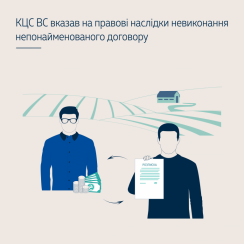Contact center of the Ukrainian Judiciary 044 207-35-46

The plaintiff provided the defendant with funds for the purchase of a land plot for further resale and profit, which the parties intended to share, about which the defendant subsequently wrote a written receipt. He did not fulfill his obligations for many years, therefore the plaintiff asked the court to collect the debt under the loan agreement.
The court of first instance upheld the claim, since the absence of legal relations between the parties under the loan agreement does not imply that the plaintiff has no right to return the funds provided to the defendant. The defendant's arguments about the uncertainty of the legal nature of the document (receipt) are of no significant importance, since it clearly and specifically states that he took funds from the plaintiff for the indicated purposes and further failed to fulfill his obligations.
The court of appeal reversed the judgment of the district court and dismissed the claim on the grounds that the plaintiff had indicated that the defendant had acquired and retained money on the basis that later was withdrawn. This suggests that the plaintiff asked to recover funds from the defendant according to Art. 1212 of the Civil Code of Ukraine. At the same time, there is a legal relationship between the parties for the conduct of investment activities, but the plaintiff did not request the defendant to terminate or dissolve an investment-related obligation, nor did the plaintiff bring an appropriate action before the court. And the provisions of Art. 1212 of the Civil Code of Ukraine are not to be applied to disputed legal relations.
The Civil Cassation Court within the Supreme Court overturned the judgment of the court of appeal, granted the claim, changing the reasoning of the first instance judgment, and made the following legal conclusions.
The doctrine of venire contra factum proprium (prohibition of contradictory behavior) is based on the Roman maxim - non concedit venire contra factum proprium (no one can act contrary to his previous behavior). The doctrine of venire contra factum proprium is based on the principle of good faith (para. 6, Art. 3 of the Civil Code of Ukraine).
A reclassification of an agreement may occur, inter alia, in the case of: a) invalidity of the agreement (in particular a sham agreement); b) interpretation of the content of the agreement. A reclassification of an agreement is possible only when it takes place within a dispute concerning such an agreement.
According to Art. 6 of the Civil Code of Ukraine, the parties have the right to conclude agreements that are not provided for by acts of civil law, if they comply with the general principles of civil law. Such agreements are unnamed.
The interpretation of the content of the document on receipt of funds indicates that the parties concluded an unnamed agreement on the acquisition and use of a land plot.
The court of appeal did not take into account the fact that if the performing party did not receive a provision in return in the amount corresponding to the transferred property (paid funds), and subsequently renounced the contract, then it may require from the party that breached the agreement and failed to provide in return to return property (funds) on the basis of para. 3, part 3, Art. 1212 of the Civil Code of Ukraine.
Obviously, the actions of the defendant, who received funds from the plaintiff to resolve the issue of acquiring a land plot, agreed to acquire it, but did not fulfill his obligation and refuses to return the funds received after the creditor's withdrawal from the agreement, are contrary to his preliminary behavior (receiving funds and establishing an obligation to acquire a land plot) and are in bad faith.
Under such circumstances, taking into account the fact that the plaintiff renounced the contract, and the defendant did not acquire the land plot, the defendant has an obligation to return the funds received, therefore the court of first instance made a substantially correct decision to recover them, although it did not apply part 3 of Art. 6, para. 3, part 3 of Art. 1212 of the Civil Code of Ukraine.
Resolution of the Supreme Court of November 09, 2022, in case No. 754/13893/19 (proceedings No. 61-737св22) – https://reyestr.court.gov.ua/Review/107370785.
This and other legal positions of the Supreme Court can be found in the Database of Legal Positions of the Supreme Court - lpd.court.gov.ua/login.